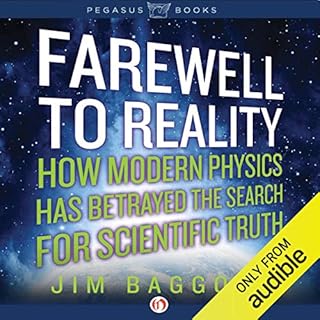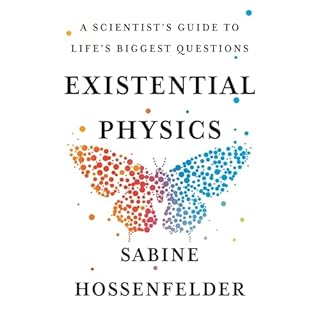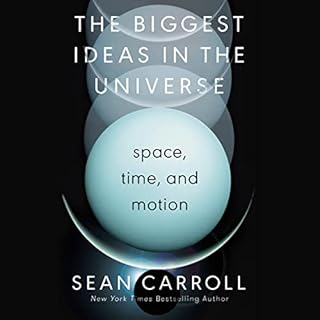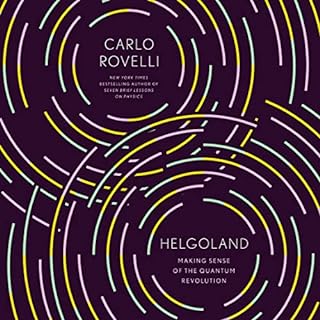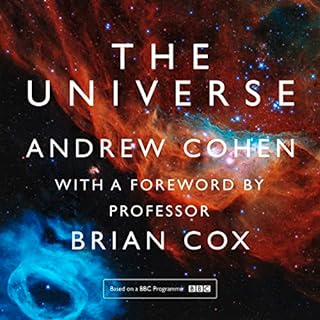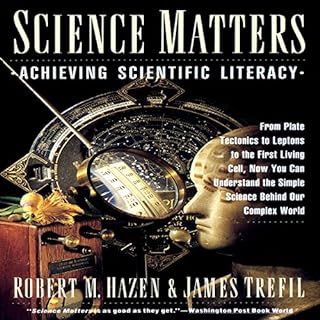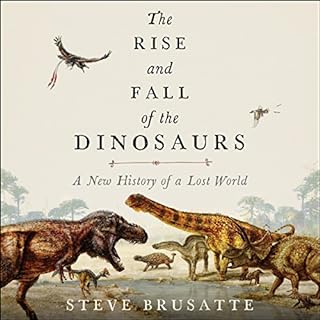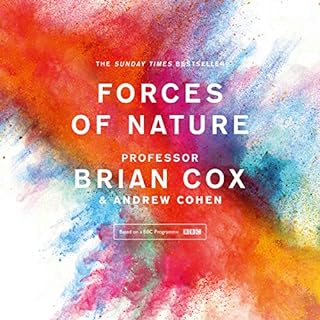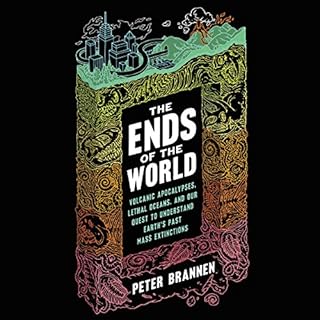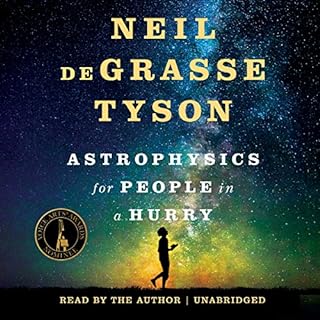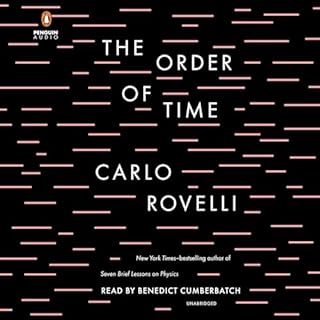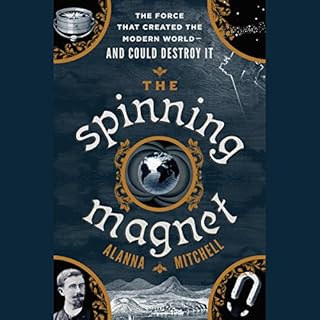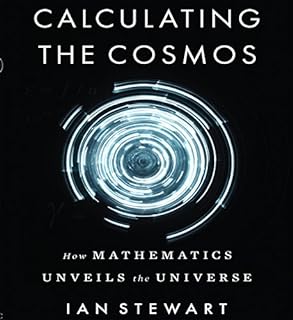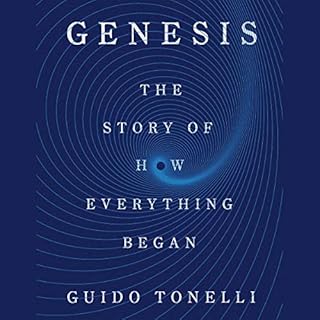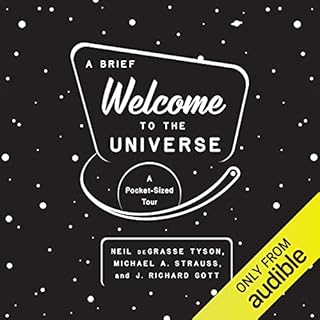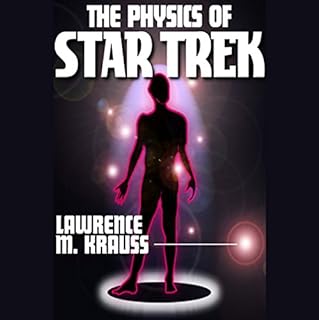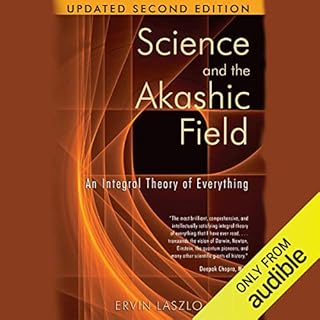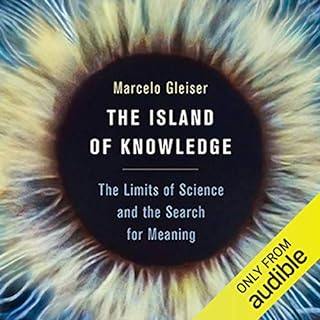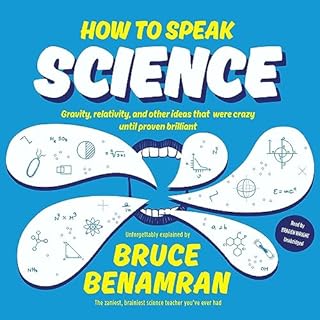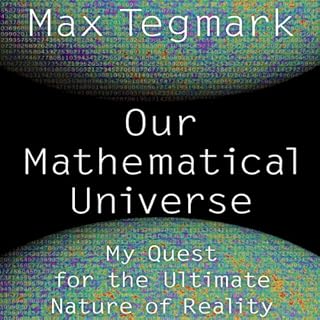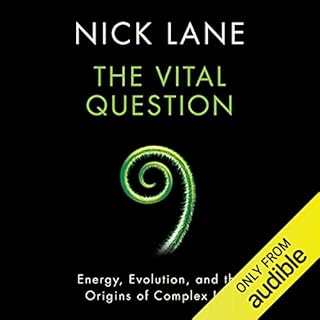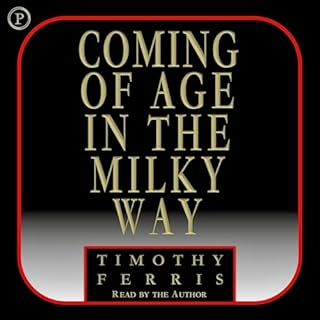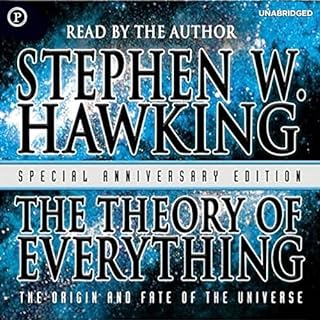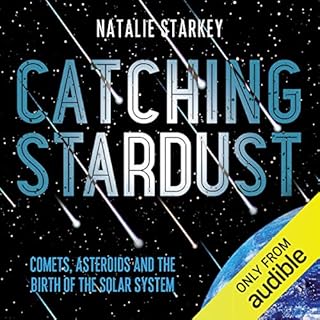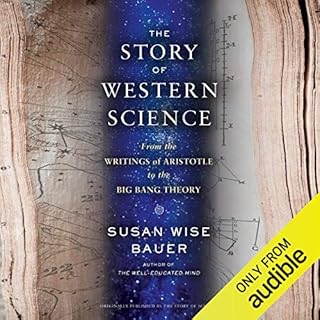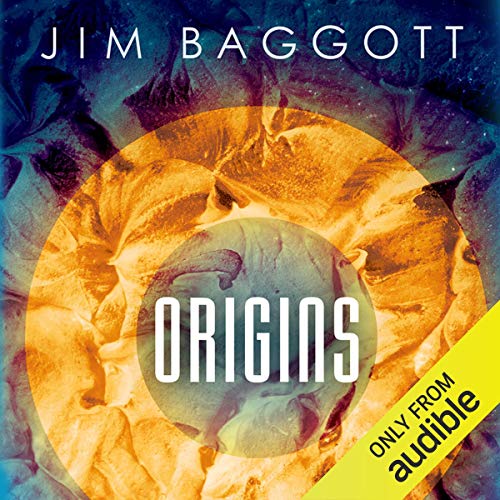
Origins
The Scientific Story of Creation
Failed to add items
Add to Cart failed.
Add to Wish List failed.
Remove from wishlist failed.
Adding to library failed
Follow podcast failed
Unfollow podcast failed
$0.99/mo first 3 months
 Prime members: New to Audible?
Prime members: New to Audible?Get 2 free audiobooks during trial.
Buy for $29.95
No default payment method selected.
We are sorry. We are not allowed to sell this product with the selected payment method
-
Narrated by:
-
Neil Scott-Barbour
-
By:
-
Jim Baggott
About this listen
What is the nature of the material world? How does it work? What is the universe and how was it formed? What is life? Where do we come from and how did we evolve? How and why do we think? What does it mean to be human? How do we know? There are many different versions of our creation story. This book tells the version according to modern science. It is a unique account, starting at the Big Bang and travelling right up to the emergence of humans as conscious intelligent beings, 13.8 billion years later. Chapter by chapter, it sets out the current state of scientific knowledge: the origins of space and time; energy, mass, and light; galaxies, stars, and our sun; the habitable earth, and complex life itself. Drawing together the physical and biological sciences, Baggott recounts what we currently know of our history, highlighting the questions science has yet to answer.
Download the accompanying reference guide.©2015 Jim Baggott (P)2016 Audible, Inc.Listeners also enjoyed...
-
Quantum Space
- Loop Quantum Gravity and the Search for the Structure of Space, Time, and the Universe
- By: Jim Baggott
- Narrated by: Nigel Patterson
- Length: 10 hrs and 16 mins
- Unabridged
-
Overall4.5 out of 5 stars 202
-
Performance4.5 out of 5 stars 172
-
Story4.5 out of 5 stars 171
Today we are blessed with two extraordinarily successful theories of physics. The first is Albert Einstein's general theory of relativity, which describes the large-scale behavior of matter in a curved spacetime. The second is quantum mechanics. This theory describes the properties and behavior of matter and radiation at their smallest scales.
-
4 out of 5 stars
-
Interesting but not Convincing
- By Michael on 10-08-19
By: Jim Baggott
-
Farewell to Reality
- How Modern Physics Has Betrayed the Search for Scientific Truth
- By: Jim Baggott
- Narrated by: Philip Rose
- Length: 13 hrs and 10 mins
- Unabridged
-
Overall4 out of 5 stars 104
-
Performance4 out of 5 stars 86
-
Story4 out of 5 stars 87
In this stunning new volume, Jim Baggott argues that there is no observational or experimental evidence for many of the ideas of modern theoretical physics: Super-symmetric particles, super strings, the multiverse, the holographic principle, or the anthropic cosmological principle. These theories are not only untrue; they are not even science. They are fairy-tale physics: Fantastical, bizarre and often outrageous, perhaps even confidence-trickery. This book provides a much-needed antidote.
-
3 out of 5 stars
-
Not a Lot of Fun or Anything Else
- By Michael on 02-24-14
By: Jim Baggott
-
Existential Physics
- A Scientist's Guide to Life's Biggest Questions
- By: Sabine Hossenfelder
- Narrated by: Gina Daniels
- Length: 8 hrs and 7 mins
- Unabridged
-
Overall4.5 out of 5 stars 408
-
Performance4.5 out of 5 stars 361
-
Story4.5 out of 5 stars 355
Not only can we not currently explain the origin of the universe, it is questionable we will ever be able to explain it. The notion that there are universes within particles, or that particles are conscious, is ascientific, as is the hypothesis that our universe is a computer simulation. On the other hand, the idea that the universe itself is conscious is difficult to rule out entirely.
-
2 out of 5 stars
-
Unscientific and unengaging
- By Jase G on 03-29-23
-
The Rise and Reign of the Mammals
- A New History, from the Shadow of the Dinosaurs to Us
- By: Steve Brusatte
- Narrated by: Patrick Lawlor
- Length: 13 hrs and 25 mins
- Unabridged
-
Overall4.5 out of 5 stars 536
-
Performance4.5 out of 5 stars 446
-
Story4.5 out of 5 stars 447
We humans are the inheritors of a dynasty that has reigned over the planet for nearly 66 million years, through fiery cataclysm and ice ages: the mammals. Our lineage includes saber-toothed tigers, woolly mammoths, armadillos the size of a car, cave bears three times the weight of a grizzly, clever scurriers that outlasted Tyrannosaurus rex, and even other types of humans, like Neanderthals.
-
5 out of 5 stars
-
Fantastic Book
- By Peter Jensen on 09-08-22
By: Steve Brusatte
-
The Edge of Knowledge
- Unsolved Mysteries of the Cosmos
- By: Lawrence M. Krauss
- Narrated by: Lawrence M. Krauss
- Length: 7 hrs and 39 mins
- Unabridged
-
Overall4.5 out of 5 stars 42
-
Performance4.5 out of 5 stars 36
-
Story5 out of 5 stars 36
Three of the most important words in science are I don't know. Not knowing implies a universe of opportunities—the possibility of discovery and surprise. Our understanding of science has advanced immeasurably over the last 500 years, yet many fundamental mysteries of existence persist: How did our universe begin? How big is the universe? Is time travel possible? What’s at the center of a black hole? How did life on Earth arise? Are we alone? What is consciousness, and can we create it?
-
1 out of 5 stars
-
he lacks knowledge about his topics
- By Anonymous User on 05-28-23
-
The Biggest Ideas in the Universe
- Space, Time, and Motion
- By: Sean Carroll
- Narrated by: Sean Carroll
- Length: 9 hrs and 55 mins
- Unabridged
-
Overall4.5 out of 5 stars 129
-
Performance4.5 out of 5 stars 107
-
Story4.5 out of 5 stars 107
The most trusted explainer of the most mind-boggling concepts pulls back the veil of mystery that has too long cloaked the most valuable building blocks of modern science. Sean Carroll, with his genius for making complex notions entertaining, presents in his uniquely lucid voice the fundamental ideas informing the modern physics of reality. In the tradition of the legendary Richard Feynman lectures presented sixty years ago, this book is an inspiring, dazzling introduction to a way of seeing that will resonate across cultural and generational boundaries for many years to come.
-
5 out of 5 stars
-
Accompanying PDF is Included
- By Barton on 11-21-22
By: Sean Carroll
-
Quantum Space
- Loop Quantum Gravity and the Search for the Structure of Space, Time, and the Universe
- By: Jim Baggott
- Narrated by: Nigel Patterson
- Length: 10 hrs and 16 mins
- Unabridged
-
Overall4.5 out of 5 stars 202
-
Performance4.5 out of 5 stars 172
-
Story4.5 out of 5 stars 171
Today we are blessed with two extraordinarily successful theories of physics. The first is Albert Einstein's general theory of relativity, which describes the large-scale behavior of matter in a curved spacetime. The second is quantum mechanics. This theory describes the properties and behavior of matter and radiation at their smallest scales.
-
4 out of 5 stars
-
Interesting but not Convincing
- By Michael on 10-08-19
By: Jim Baggott
-
Farewell to Reality
- How Modern Physics Has Betrayed the Search for Scientific Truth
- By: Jim Baggott
- Narrated by: Philip Rose
- Length: 13 hrs and 10 mins
- Unabridged
-
Overall4 out of 5 stars 104
-
Performance4 out of 5 stars 86
-
Story4 out of 5 stars 87
In this stunning new volume, Jim Baggott argues that there is no observational or experimental evidence for many of the ideas of modern theoretical physics: Super-symmetric particles, super strings, the multiverse, the holographic principle, or the anthropic cosmological principle. These theories are not only untrue; they are not even science. They are fairy-tale physics: Fantastical, bizarre and often outrageous, perhaps even confidence-trickery. This book provides a much-needed antidote.
-
3 out of 5 stars
-
Not a Lot of Fun or Anything Else
- By Michael on 02-24-14
By: Jim Baggott
-
Existential Physics
- A Scientist's Guide to Life's Biggest Questions
- By: Sabine Hossenfelder
- Narrated by: Gina Daniels
- Length: 8 hrs and 7 mins
- Unabridged
-
Overall4.5 out of 5 stars 408
-
Performance4.5 out of 5 stars 361
-
Story4.5 out of 5 stars 355
Not only can we not currently explain the origin of the universe, it is questionable we will ever be able to explain it. The notion that there are universes within particles, or that particles are conscious, is ascientific, as is the hypothesis that our universe is a computer simulation. On the other hand, the idea that the universe itself is conscious is difficult to rule out entirely.
-
2 out of 5 stars
-
Unscientific and unengaging
- By Jase G on 03-29-23
-
The Rise and Reign of the Mammals
- A New History, from the Shadow of the Dinosaurs to Us
- By: Steve Brusatte
- Narrated by: Patrick Lawlor
- Length: 13 hrs and 25 mins
- Unabridged
-
Overall4.5 out of 5 stars 536
-
Performance4.5 out of 5 stars 446
-
Story4.5 out of 5 stars 447
We humans are the inheritors of a dynasty that has reigned over the planet for nearly 66 million years, through fiery cataclysm and ice ages: the mammals. Our lineage includes saber-toothed tigers, woolly mammoths, armadillos the size of a car, cave bears three times the weight of a grizzly, clever scurriers that outlasted Tyrannosaurus rex, and even other types of humans, like Neanderthals.
-
5 out of 5 stars
-
Fantastic Book
- By Peter Jensen on 09-08-22
By: Steve Brusatte
-
The Edge of Knowledge
- Unsolved Mysteries of the Cosmos
- By: Lawrence M. Krauss
- Narrated by: Lawrence M. Krauss
- Length: 7 hrs and 39 mins
- Unabridged
-
Overall4.5 out of 5 stars 42
-
Performance4.5 out of 5 stars 36
-
Story5 out of 5 stars 36
Three of the most important words in science are I don't know. Not knowing implies a universe of opportunities—the possibility of discovery and surprise. Our understanding of science has advanced immeasurably over the last 500 years, yet many fundamental mysteries of existence persist: How did our universe begin? How big is the universe? Is time travel possible? What’s at the center of a black hole? How did life on Earth arise? Are we alone? What is consciousness, and can we create it?
-
1 out of 5 stars
-
he lacks knowledge about his topics
- By Anonymous User on 05-28-23
-
The Biggest Ideas in the Universe
- Space, Time, and Motion
- By: Sean Carroll
- Narrated by: Sean Carroll
- Length: 9 hrs and 55 mins
- Unabridged
-
Overall4.5 out of 5 stars 129
-
Performance4.5 out of 5 stars 107
-
Story4.5 out of 5 stars 107
The most trusted explainer of the most mind-boggling concepts pulls back the veil of mystery that has too long cloaked the most valuable building blocks of modern science. Sean Carroll, with his genius for making complex notions entertaining, presents in his uniquely lucid voice the fundamental ideas informing the modern physics of reality. In the tradition of the legendary Richard Feynman lectures presented sixty years ago, this book is an inspiring, dazzling introduction to a way of seeing that will resonate across cultural and generational boundaries for many years to come.
-
5 out of 5 stars
-
Accompanying PDF is Included
- By Barton on 11-21-22
By: Sean Carroll
-
How the Earth Works
- By: Michael E. Wysession, The Great Courses
- Narrated by: Michael E. Wysession
- Length: 24 hrs and 31 mins
- Original Recording
-
Overall4.5 out of 5 stars 1,729
-
Performance4.5 out of 5 stars 1,509
-
Story4.5 out of 5 stars 1,491
How the Earth Works takes you on an astonishing journey through time and space. In 48 lectures, you will look at what went into making our planet - from the big bang, to the formation of the solar system, to the subsequent evolution of Earth.
-
5 out of 5 stars
-
Excellent course
- By Doug B. on 05-23-19
By: Michael E. Wysession, and others
-
Helgoland
- Making Sense of the Quantum Revolution
- By: Carlo Rovelli, Erica Segre - translator, Simon Carnell - translator
- Narrated by: David Rintoul
- Length: 4 hrs and 31 mins
- Unabridged
-
Overall4.5 out of 5 stars 574
-
Performance5 out of 5 stars 498
-
Story4.5 out of 5 stars 494
One of the world's most renowned theoretical physicists, Carlo Rovelli has entranced millions of readers with his singular perspective on the cosmos. In Helgoland, he examines the enduring enigma of quantum theory. The quantum world Rovelli describes is as beautiful as it is unnerving. Helgoland is a treeless island in the North Sea where the 23-year-old Werner Heisenberg made the crucial breakthrough for the creation of quantum mechanics, setting off a century of scientific revolution.
-
3 out of 5 stars
-
The cat is not sleeping
- By Anonymous on 05-30-21
By: Carlo Rovelli, and others
-
The Song of the Cell
- An Exploration of Medicine and the New Human
- By: Siddhartha Mukherjee
- Narrated by: Dennis Boutsikaris
- Length: 16 hrs and 3 mins
- Unabridged
-
Overall4.5 out of 5 stars 861
-
Performance4.5 out of 5 stars 730
-
Story4.5 out of 5 stars 724
From the author of The Emperor of All Maladies, winner of the Pulitzer Prize, and The Gene, a #1 New York Times bestseller, comes his most spectacular book yet, an exploration of medicine and our radical new ability to manipulate cells. Rich with Mukherjee’s revelatory and exhilarating stories of scientists, doctors, and the patients whose lives may be saved by their work, The Song of the Cell is the third book in this extraordinary writer’s exploration of what it means to be human.
-
5 out of 5 stars
-
Beyond Words Wonderful
- By Lynn on 11-27-22
-
Einstein's Unfinished Dream
- Practical Progress Towards a Theory of Everything
- By: Don Lincoln
- Narrated by: Daniel Henning
- Length: 9 hrs and 56 mins
- Unabridged
-
Overall5 out of 5 stars 21
-
Performance4.5 out of 5 stars 21
-
Story4.5 out of 5 stars 21
Humanity has long looked to the sky and marveled at the world around us. We've wondered why the world is the way it is and whether it has to be that way. And we dream of a time when we have developed a theory of everything—a theory that answers all questions. Einstein's Unfinished Dream explores the cutting-edge research of modern particle physicists that pushes us slowly towards a theory of everything....
-
4 out of 5 stars
-
Simple to understand but….
- By dg on 06-10-24
By: Don Lincoln
-
The Universe
- The Book of the BBC TV Series Presented by Professor Brian Cox
- By: Andrew Cohen, Professor Brian Cox - foreword
- Narrated by: Brian Cox, Professor Jot Davies
- Length: 8 hrs and 32 mins
- Unabridged
-
Overall4.5 out of 5 stars 106
-
Performance4.5 out of 5 stars 93
-
Story4.5 out of 5 stars 93
With a foreword from Professor Brian Cox and access to all the latest NASA mission information, Andrew Cohen takes listeners on a voyage of discovery via the probes and telescopes exploring the outer reaches of our galaxy, revealing how it was formed and how it will inevitably be destroyed by the enigmatic black hole at its heart. And beyond our galaxy, the expanding universe, which holds clues to the biggest mystery of all - how did it all begin?
-
5 out of 5 stars
-
Listen to this alone and with your loved ones. You’ll be transported and inspired
- By MH on 02-26-22
By: Andrew Cohen, and others
-
Science Matters
- Achieving Scientific Literacy
- By: Robert M. Hazen, James Trefil
- Narrated by: Fred Sanders
- Length: 11 hrs and 16 mins
- Unabridged
-
Overall4 out of 5 stars 335
-
Performance4.5 out of 5 stars 188
-
Story4.5 out of 5 stars 185
Knowledge of the basic ideas and principles of science is fundamental to cultural literacy. But most books on science are often too obscure or too specialized to do the general listener much good.
-
5 out of 5 stars
-
Everything I thought I knew, brilliantly told.
- By Joshua on 09-18-09
By: Robert M. Hazen, and others
-
The Rise and Fall of the Dinosaurs
- A New History of a Lost World
- By: Steve Brusatte
- Narrated by: Patrick Lawlor
- Length: 10 hrs and 7 mins
- Unabridged
-
Overall4.5 out of 5 stars 4,465
-
Performance4.5 out of 5 stars 4,013
-
Story4.5 out of 5 stars 3,993
In this stunning narrative spanning more than 200 million years, Steve Brusatte, a young American paleontologist who has emerged as one of the foremost stars of the field - discovering 10 new species and leading groundbreaking scientific studies and fieldwork - masterfully tells the complete, surprising, and new history of the dinosaurs, drawing on cutting-edge science to dramatically bring to life their lost world and illuminate their enigmatic origins, spectacular flourishing, astonishing diversity, cataclysmic extinction, and startling living legacy.
-
2 out of 5 stars
-
"The Rise of the Scientists Who Study Dinosaurs"
- By Daniel Powell on 09-16-18
By: Steve Brusatte
-
Forces of Nature
- By: Professor Brian Cox, Andrew Cohen
- Narrated by: Samuel West
- Length: 7 hrs and 15 mins
- Unabridged
-
Overall4.5 out of 5 stars 490
-
Performance5 out of 5 stars 438
-
Story4.5 out of 5 stars 432
Professor Brian Cox uncovers some of the most extraordinary natural events on Earth and in the universe and beyond. From the immensity of the universe and the roundness of Earth to the form of every single snowflake, the forces of nature shape everything we see. Pushed to extremes, the results are astonishing. In seeking to understand the everyday world, the colours, structure, behaviour and history of our home, we develop the knowledge and techniques necessary to step beyond the everyday.
-
4 out of 5 stars
-
Complicated in its simplicity
- By Philomath on 06-13-17
By: Professor Brian Cox, and others
-
The Ends of the World
- Volcanic Apocalypses, Lethal Oceans, and Our Quest to Understand Earth's Past Mass Extinctions
- By: Peter Brannen
- Narrated by: Adam Verner
- Length: 9 hrs and 57 mins
- Unabridged
-
Overall4.5 out of 5 stars 1,970
-
Performance4.5 out of 5 stars 1,763
-
Story4.5 out of 5 stars 1,754
Our world has ended five times: It has been broiled, frozen, poison gassed, smothered, and pelted by asteroids. In The Ends of the World, Peter Brannen dives into deep time, exploring Earth's past dead ends, and in the process offers us a glimpse of our possible future. Many scientists now believe that the climate shifts of the 21st century have analogs in these five extinctions.
-
5 out of 5 stars
-
A Kid's Science Book FOR ADULTS!!
- By aaron on 06-15-17
By: Peter Brannen
-
Astrophysics for People in a Hurry
- By: Neil deGrasse Tyson
- Narrated by: Neil deGrasse Tyson
- Length: 3 hrs and 41 mins
- Unabridged
-
Overall4.5 out of 5 stars 38,090
-
Performance5 out of 5 stars 33,406
-
Story4.5 out of 5 stars 33,124
What is the nature of space and time? How do we fit within the universe? How does the universe fit within us? There's no better guide through these mind-expanding questions than acclaimed astrophysicist and best-selling author Neil deGrasse Tyson. But today, few of us have time to contemplate the cosmos. So Tyson brings the universe down to Earth succinctly and clearly, with sparkling wit, in digestible chapters consumable anytime and anywhere in your busy day.
-
2 out of 5 stars
-
Disappointing - not much physics
- By Rob Hahn on 07-15-17
-
The Order of Time
- By: Carlo Rovelli
- Narrated by: Benedict Cumberbatch
- Length: 4 hrs and 19 mins
- Unabridged
-
Overall4.5 out of 5 stars 4,989
-
Performance5 out of 5 stars 4,352
-
Story4.5 out of 5 stars 4,311
In lyric, accessible prose, Carlo Rovelli invites us to consider questions about the nature of time that continue to puzzle physicists and philosophers alike. For most listeners, this is unfamiliar terrain. We all experience time, but the more scientists learn about it, the more mysterious it appears. We think of it as uniform and universal, moving steadily from past to future, measured by clocks. Rovelli tears down these assumptions one by one, revealing a strange universe where, at the most fundamental level, time disappears.
-
5 out of 5 stars
-
Rovelli is a Genius
- By Mike on 05-11-18
By: Carlo Rovelli
-
The Spinning Magnet
- The Electromagnetic Force that Created the Modern World - and Could Destroy It
- By: Alanna Mitchell
- Narrated by: P.J. Ochlan
- Length: 9 hrs and 37 mins
- Unabridged
-
Overall4.5 out of 5 stars 106
-
Performance4.5 out of 5 stars 86
-
Story4.5 out of 5 stars 84
A cataclysmic planetary phenomenon is gathering force deep within the Earth. The magnetic North Pole will eventually trade places with the South Pole. Satellite evidence suggests to some scientists that the move has already begun, but most still think it won't happen for many decades. All agree that it has happened many times before and will happen again. But this time it will be different. It will be a very bad day for modern civilization.
-
4 out of 5 stars
-
Important topic, not what I was looking for
- By Ramona on 03-28-21
By: Alanna Mitchell
Related to this topic
-
Forces of Nature
- By: Professor Brian Cox, Andrew Cohen
- Narrated by: Samuel West
- Length: 7 hrs and 15 mins
- Unabridged
-
Overall4.5 out of 5 stars 490
-
Performance5 out of 5 stars 438
-
Story4.5 out of 5 stars 432
Professor Brian Cox uncovers some of the most extraordinary natural events on Earth and in the universe and beyond. From the immensity of the universe and the roundness of Earth to the form of every single snowflake, the forces of nature shape everything we see. Pushed to extremes, the results are astonishing. In seeking to understand the everyday world, the colours, structure, behaviour and history of our home, we develop the knowledge and techniques necessary to step beyond the everyday.
-
4 out of 5 stars
-
Complicated in its simplicity
- By Philomath on 06-13-17
By: Professor Brian Cox, and others
-
Exoplanets
- Diamond Worlds, Super Earths, Pulsar Planets, and the New Search for Life Beyond Our Solar System
- By: Michael Summers
- Narrated by: Jon Bennett
- Length: 5 hrs and 39 mins
- Unabridged
-
Overall4.5 out of 5 stars 178
-
Performance4.5 out of 5 stars 147
-
Story4.5 out of 5 stars 145
Since its 2009 launch, the Kepler satellite has discovered more than 2,000 exoplanets, or planets outside our solar system. More exoplanets are being discovered all the time, remarkable in their variety. Astronomer Michael Summers and physicist James Trefil explore these remarkable recent discoveries: planets revolving around pulsars, planets made of diamond, planets that are mostly water, and numerous rogue planets wandering through the emptiness of space.
-
5 out of 5 stars
-
FINALLY, an Attention-Grabbing Planet Book!
- By aaron on 05-11-17
By: Michael Summers
-
Calculating the Cosmos
- How Mathematics Unveils the Universe
- By: Ian Stewart
- Narrated by: Dana Hickox
- Length: 12 hrs and 39 mins
- Unabridged
-
Overall4.5 out of 5 stars 118
-
Performance3.5 out of 5 stars 111
-
Story4.5 out of 5 stars 107
In Calculating the Cosmos, Ian Stewart presents an exhilarating guide to the cosmos, from our solar system to the entire universe. He describes the architecture of space and time, dark matter and dark energy, how galaxies form, why stars implode, how everything began, and how it's all going to end. He considers parallel universes, the fine-tuning of the cosmos for life, what forms extraterrestrial life might take, and the likelihood of life on Earth being snuffed out by an asteroid.
-
2 out of 5 stars
-
Crank alert: rejects modern cosmology
- By James Weisner on 03-20-17
By: Ian Stewart
-
The Cosmic Cocktail
- Three Parts Dark Matter
- By: Katherine Freese
- Narrated by: Tamara Marston
- Length: 9 hrs and 29 mins
- Unabridged
-
Overall4 out of 5 stars 103
-
Performance4 out of 5 stars 87
-
Story4 out of 5 stars 87
The ordinary atoms that make up the known universe - from our bodies and the air we breathe to the planets and stars - constitute only 5 percent of all matter and energy in the cosmos. The rest is known as dark matter and dark energy, because their precise identities are unknown. The Cosmic Cocktail is the inside story of the epic quest to solve one of the most compelling enigmas of modern science - what is the universe made of? - told by one of today’s foremost pioneers in the study of dark matter.
-
2 out of 5 stars
-
I was looking for a book about science....
- By Jeff on 03-27-15
By: Katherine Freese
-
Life’s Ratchet
- How Molecular Machines Extract Order from Chaos
- By: Peter M. Hoffman
- Narrated by: Paul Hodgson
- Length: 9 hrs and 52 mins
- Unabridged
-
Overall4.5 out of 5 stars 448
-
Performance4.5 out of 5 stars 387
-
Story4.5 out of 5 stars 382
The cells in our bodies consist of molecules, made up of the same carbon, oxygen, and hydrogen atoms found in air and rocks. But molecules, such as water and sugar, are not alive. So how do our cells - assemblies of otherwise "dead" molecules - come to life, and together constitute a living being? In Life’s Ratchet, physicist Peter M. Hoffmann locates the answer to this age-old question at the nanoscale.
-
5 out of 5 stars
-
For biologists to learn single molecule biophysics
- By A Synthetic Biologist on 09-04-14
By: Peter M. Hoffman
-
Genesis
- The Story of How Everything Began
- By: Guido Tonelli, Erica Segre - translator, Simon Carnell - translator
- Narrated by: Damian Lynch
- Length: 6 hrs and 49 mins
- Unabridged
-
Overall4.5 out of 5 stars 42
-
Performance4.5 out of 5 stars 35
-
Story4.5 out of 5 stars 35
A breakout best seller in Italy, now available for American listeners for the first time, Genesis: The Story of How Everything Began is a short, humanistic tour of the origins of the universe, earth, and life - drawing on the latest discoveries in physics to explain the seven most significant moments in the creation of the cosmos.
-
2 out of 5 stars
-
This is soooo boring to listen to
- By A. Galer on 02-27-23
By: Guido Tonelli, and others
-
Forces of Nature
- By: Professor Brian Cox, Andrew Cohen
- Narrated by: Samuel West
- Length: 7 hrs and 15 mins
- Unabridged
-
Overall4.5 out of 5 stars 490
-
Performance5 out of 5 stars 438
-
Story4.5 out of 5 stars 432
Professor Brian Cox uncovers some of the most extraordinary natural events on Earth and in the universe and beyond. From the immensity of the universe and the roundness of Earth to the form of every single snowflake, the forces of nature shape everything we see. Pushed to extremes, the results are astonishing. In seeking to understand the everyday world, the colours, structure, behaviour and history of our home, we develop the knowledge and techniques necessary to step beyond the everyday.
-
4 out of 5 stars
-
Complicated in its simplicity
- By Philomath on 06-13-17
By: Professor Brian Cox, and others
-
Exoplanets
- Diamond Worlds, Super Earths, Pulsar Planets, and the New Search for Life Beyond Our Solar System
- By: Michael Summers
- Narrated by: Jon Bennett
- Length: 5 hrs and 39 mins
- Unabridged
-
Overall4.5 out of 5 stars 178
-
Performance4.5 out of 5 stars 147
-
Story4.5 out of 5 stars 145
Since its 2009 launch, the Kepler satellite has discovered more than 2,000 exoplanets, or planets outside our solar system. More exoplanets are being discovered all the time, remarkable in their variety. Astronomer Michael Summers and physicist James Trefil explore these remarkable recent discoveries: planets revolving around pulsars, planets made of diamond, planets that are mostly water, and numerous rogue planets wandering through the emptiness of space.
-
5 out of 5 stars
-
FINALLY, an Attention-Grabbing Planet Book!
- By aaron on 05-11-17
By: Michael Summers
-
Calculating the Cosmos
- How Mathematics Unveils the Universe
- By: Ian Stewart
- Narrated by: Dana Hickox
- Length: 12 hrs and 39 mins
- Unabridged
-
Overall4.5 out of 5 stars 118
-
Performance3.5 out of 5 stars 111
-
Story4.5 out of 5 stars 107
In Calculating the Cosmos, Ian Stewart presents an exhilarating guide to the cosmos, from our solar system to the entire universe. He describes the architecture of space and time, dark matter and dark energy, how galaxies form, why stars implode, how everything began, and how it's all going to end. He considers parallel universes, the fine-tuning of the cosmos for life, what forms extraterrestrial life might take, and the likelihood of life on Earth being snuffed out by an asteroid.
-
2 out of 5 stars
-
Crank alert: rejects modern cosmology
- By James Weisner on 03-20-17
By: Ian Stewart
-
The Cosmic Cocktail
- Three Parts Dark Matter
- By: Katherine Freese
- Narrated by: Tamara Marston
- Length: 9 hrs and 29 mins
- Unabridged
-
Overall4 out of 5 stars 103
-
Performance4 out of 5 stars 87
-
Story4 out of 5 stars 87
The ordinary atoms that make up the known universe - from our bodies and the air we breathe to the planets and stars - constitute only 5 percent of all matter and energy in the cosmos. The rest is known as dark matter and dark energy, because their precise identities are unknown. The Cosmic Cocktail is the inside story of the epic quest to solve one of the most compelling enigmas of modern science - what is the universe made of? - told by one of today’s foremost pioneers in the study of dark matter.
-
2 out of 5 stars
-
I was looking for a book about science....
- By Jeff on 03-27-15
By: Katherine Freese
-
Life’s Ratchet
- How Molecular Machines Extract Order from Chaos
- By: Peter M. Hoffman
- Narrated by: Paul Hodgson
- Length: 9 hrs and 52 mins
- Unabridged
-
Overall4.5 out of 5 stars 448
-
Performance4.5 out of 5 stars 387
-
Story4.5 out of 5 stars 382
The cells in our bodies consist of molecules, made up of the same carbon, oxygen, and hydrogen atoms found in air and rocks. But molecules, such as water and sugar, are not alive. So how do our cells - assemblies of otherwise "dead" molecules - come to life, and together constitute a living being? In Life’s Ratchet, physicist Peter M. Hoffmann locates the answer to this age-old question at the nanoscale.
-
5 out of 5 stars
-
For biologists to learn single molecule biophysics
- By A Synthetic Biologist on 09-04-14
By: Peter M. Hoffman
-
Genesis
- The Story of How Everything Began
- By: Guido Tonelli, Erica Segre - translator, Simon Carnell - translator
- Narrated by: Damian Lynch
- Length: 6 hrs and 49 mins
- Unabridged
-
Overall4.5 out of 5 stars 42
-
Performance4.5 out of 5 stars 35
-
Story4.5 out of 5 stars 35
A breakout best seller in Italy, now available for American listeners for the first time, Genesis: The Story of How Everything Began is a short, humanistic tour of the origins of the universe, earth, and life - drawing on the latest discoveries in physics to explain the seven most significant moments in the creation of the cosmos.
-
2 out of 5 stars
-
This is soooo boring to listen to
- By A. Galer on 02-27-23
By: Guido Tonelli, and others
-
A Brief Welcome to the Universe
- A Pocket-Sized Tour
- By: Neil deGrasse Tyson, Michael A. Strauss, J. Richard Gott
- Narrated by: Neil Hellegers
- Length: 4 hrs and 7 mins
- Unabridged
-
Overall4.5 out of 5 stars 68
-
Performance4.5 out of 5 stars 53
-
Story4.5 out of 5 stars 53
A Brief Welcome to the Universe offers a breathtaking tour of the cosmos, from planets, stars, and galaxies to black holes and time loops. Best-selling authors and acclaimed astrophysicists Neil deGrasse Tyson, Michael A. Strauss, and J. Richard Gott take listeners on an unforgettable journey of exploration to reveal how our universe actually works. Propelling you from our home solar system to the outermost frontiers of space, this book builds your cosmic insight and perspective through a marvelously entertaining narrative.
-
5 out of 5 stars
-
A brief welcome for everyone
- By Ashley F on 08-24-24
By: Neil deGrasse Tyson, and others
-
The Physics of Star Trek
- By: Lawrence M. Krauss
- Narrated by: Larry McKeever
- Length: 6 hrs and 40 mins
- Unabridged
-
Overall4 out of 5 stars 407
-
Performance4 out of 5 stars 264
-
Story4.5 out of 5 stars 262
What actually happens when the words, "beam me up, Scottie" are uttered? What "warps" when something travels at warp speed? Internationally renowned theoretical physicist and educator Lawrence M. Krauss provides matter-of-fact scientific explanations of the physics of Star Trek in this highly creative and informative guide for both the devoted Trekkie and the physics novice.
-
3 out of 5 stars
-
Interesting Book. Quite Technical
- By Christopher B. on 12-07-04
-
Science and the Akashic Field
- An Integral Theory of Everything
- By: Ervin Laszlo
- Narrated by: Tom Pile
- Length: 6 hrs and 52 mins
- Unabridged
-
Overall4.5 out of 5 stars 315
-
Performance4.5 out of 5 stars 265
-
Story4.5 out of 5 stars 263
Mystics and sages have long maintained that there exists an interconnecting cosmic field at the roots of reality that conserves and conveys information, a field known as the Akashic record. Recent discoveries in vacuum physics show that this Akashic field is real and has its equivalent in science's zero-point field that underlies space itself. This field consists of a subtle sea of fluctuating energies from which all things arise: atoms and galaxies, stars and planets, living beings, and even consciousness.
-
4 out of 5 stars
-
A must-read about ultimate nature of reality
- By Alexandra Hopkins on 04-15-18
By: Ervin Laszlo
-
The Island of Knowledge
- The Limits of Science and the Search for Meaning
- By: Marcelo Gleiser
- Narrated by: William Neenan
- Length: 10 hrs and 33 mins
- Unabridged
-
Overall4 out of 5 stars 552
-
Performance4.5 out of 5 stars 488
-
Story4 out of 5 stars 486
How much can we know about the world? In this audiobook physicist Marcelo Gleiser traces our search for answers to the most fundamental questions of existence, the origin of the universe, the nature of reality, and the limits of knowledge. In so doing he reaches a provocative conclusion: Science, like religion, is fundamentally limited as a tool for understanding the world. As science and its philosophical interpretations advance, we face the unsettling recognition of how much we don't know.
-
4 out of 5 stars
-
Island of knowledge
- By Joshua Kring on 07-26-15
By: Marcelo Gleiser
-
How to Speak Science
- Gravity, Relativity, and Other Ideas That Were Crazy Until Proven Brilliant
- By: Bruce Benamran, Stephanie Delozier Strobel
- Narrated by: Braden Wright
- Length: 13 hrs and 11 mins
- Unabridged
-
Overall4.5 out of 5 stars 219
-
Performance4.5 out of 5 stars 196
-
Story4.5 out of 5 stars 192
As smartphones, supercomputers, supercolliders, and AI propel us into an ever more unfamiliar future, How to Speak Science takes us on a rollicking historical tour of the greatest discoveries and ideas that make today's cutting-edge technologies possible. Wanting everyone to be able to "speak" science, YouTube science guru Bruce Benamran explains - as accessibly and wittily as in his acclaimed videos - the fundamental ideas of the physical world: matter, life, the solar system, light, electromagnetism, thermodynamics, special and general relativity, and much more.
-
5 out of 5 stars
-
Wowzers!
- By Ralph Temblador on 02-15-21
By: Bruce Benamran, and others
-
Our Mathematical Universe
- My Quest for the Ultimate Nature of Reality
- By: Max Tegmark
- Narrated by: Rob Shapiro
- Length: 15 hrs and 22 mins
- Unabridged
-
Overall4.5 out of 5 stars 2,512
-
Performance4.5 out of 5 stars 2,195
-
Story4.5 out of 5 stars 2,186
Max Tegmark leads us on an astonishing journey through past, present and future, and through the physics, astronomy, and mathematics that are the foundation of his work, most particularly his hypothesis that our physical reality is a mathematical structure and his theory of the ultimate multiverse. In a dazzling combination of both popular and groundbreaking science, he not only helps us grasp his often mind-boggling theories, but he also shares with us some of the often surprising triumphs and disappointments that have shaped his life as a scientist.
-
5 out of 5 stars
-
Wow!
- By Michael on 02-02-14
By: Max Tegmark
-
The Vital Question
- Energy, Evolution, and the Origins of Complex Life
- By: Nick Lane
- Narrated by: Kevin Pariseau
- Length: 11 hrs and 27 mins
- Unabridged
-
Overall4.5 out of 5 stars 1,179
-
Performance4.5 out of 5 stars 1,043
-
Story4.5 out of 5 stars 1,032
The Earth teems with life: in its oceans, forests, skies, and cities. Yet there's a black hole at the heart of biology. We do not know why complex life is the way it is, or, for that matter, how life first began. In The Vital Question, award-winning author and biochemist Nick Lane radically reframes evolutionary history, putting forward a solution to conundrums that have puzzled generations of scientists.
-
4 out of 5 stars
-
Ouch!
- By Mark on 06-24-16
By: Nick Lane
-
Coming of Age in the Milky Way
- By: Timothy Ferris
- Narrated by: Timothy Ferris
- Length: 2 hrs and 44 mins
- Abridged
-
Overall4 out of 5 stars 114
-
Performance4 out of 5 stars 62
-
Story4 out of 5 stars 64
Humans have long sought to comprehend the enormities of cosmic space and time. Here, best selling science writer Timothy Ferris tells the story of that quest. He interweaves the majestic themes of astronomy, physics, religion, and philosophy with fresh and lasting portraits of the men and women who created what has been called our society's most precious treasure - its conception of the universe at large.
-
2 out of 5 stars
-
Brief survey of discovery from Columbus to now
- By serine on 01-23-16
By: Timothy Ferris
-
The Theory of Everything
- The Origin and Fate of the Universe
- By: Stephen Hawking
- Narrated by: Michael York
- Length: 3 hrs and 30 mins
- Unabridged
-
Overall4.5 out of 5 stars 1,125
-
Performance4.5 out of 5 stars 925
-
Story4.5 out of 5 stars 917
In physicist Stephen Hawking's brilliant opus, A Brief History of Time, he presented us with a bold new look at our universe, how it began, and how our old views of physics and tired theories about the creation of the universe were no longer relevant. In other words, Hawking gave us a new look at our world, our universe, and ourselves. Now, Hawking presents an even more comprehensive look at our universe, its creation, and how we see ourselves within it.
-
5 out of 5 stars
-
Shares a lot of text with a Brief History of Time.
- By Roc Myers on 01-07-15
By: Stephen Hawking
-
The World According to Physics
- By: Jim Al-Khalili
- Narrated by: Jim Al-Khalili
- Length: 6 hrs and 35 mins
- Unabridged
-
Overall4.5 out of 5 stars 106
-
Performance4.5 out of 5 stars 95
-
Story4.5 out of 5 stars 95
Shining a light on the most profound insights revealed by modern physics, Jim Al-Khalili invites us all to understand what this crucially important science tells us about the universe and the nature of reality itself. Al-Khalili begins by introducing the fundamental concepts of space, time, energy, and matter, and then describes the three pillars of modern physics - quantum theory, relativity, and thermodynamics - showing how all three must come together if we are ever to have a full understanding of reality.
-
5 out of 5 stars
-
excellent book
- By Anonymous User on 05-10-21
By: Jim Al-Khalili
-
Catching Stardust
- Comets, Asteroids and the Birth of the Solar System
- By: Natalie Starkey
- Narrated by: Alison Campbell
- Length: 9 hrs and 48 mins
- Unabridged
-
Overall4.5 out of 5 stars 21
-
Performance5 out of 5 stars 20
-
Story4.5 out of 5 stars 20
Icy, rocky, sometimes dusty, always mysterious – comets and asteroids are among the Solar System's very oldest inhabitants, formed within a swirling cloud of gas and dust in the area of space that eventually hosted the Sun and its planets. Locked within each of these extra-terrestrial objects is the 4.6-billion-year wisdom of Solar System events, and by studying them at close quarters using spacecraft we can coerce them into revealing their closely-guarded secrets. This offers us the chance to answer some fundamental questions about our planet and its inhabitants.
-
5 out of 5 stars
-
A home run in space!
- By Rick B on 07-23-22
By: Natalie Starkey
-
The Story of Western Science
- From the Writings of Aristotle to the Big Bang Theory
- By: Susan Wise Bauer
- Narrated by: Julian Elfer
- Length: 8 hrs and 3 mins
- Unabridged
-
Overall4.5 out of 5 stars 293
-
Performance4.5 out of 5 stars 250
-
Story4.5 out of 5 stars 255
Far too often, public discussion of science is carried out by journalists, voters, and politicians who have received their science secondhand. The Story of Western Science shows us the joy and importance of reading groundbreaking science writing for ourselves and guides us back to the masterpieces that have changed the way we think about our world, our cosmos, and ourselves.
-
4 out of 5 stars
-
Good text, tedious book structure
- By Diane K. on 10-07-15
By: Susan Wise Bauer
What listeners say about Origins
Average customer ratingsReviews - Please select the tabs below to change the source of reviews.
-
Overall5 out of 5 stars
-
Performance5 out of 5 stars
-
Story5 out of 5 stars
- AJ
- 10-11-17
My brain is going to explode...
What an outstanding book. Its not complicated but you best have a general understanding of particle physics and cosmology. It does dive deep but he stops before you can't follow along, and he does a perfect job of it. I just can't get passed chapter 5 without my brain exploding. But I have listened to the first 5 chapters 25 times. It's that good.
Something went wrong. Please try again in a few minutes.
You voted on this review!
You reported this review!
3 people found this helpful
-
Overall4 out of 5 stars
-
Performance1 out of 5 stars
-
Story4 out of 5 stars
- UH
- 01-10-17
Interesting book, but WOW, the narrator ...
What was one of the most memorable moments of Origins?
Unfortunately, the most memorable aspect of this audiobook is how the narrator mispronounces almost every scientific term used in this audiobook. This includes the names of many important scientists that have shaped this field. This is extremely distracting for anyone with just a little bit of scientific knowledge and background. All others will learn incorrect pronunciation of the names of scientists and the names of basic scientific and biological terms. Pheny-lala-nine ....
Something went wrong. Please try again in a few minutes.
You voted on this review!
You reported this review!
5 people found this helpful
-
Overall4 out of 5 stars
-
Performance3 out of 5 stars
-
Story5 out of 5 stars
- Terri Fuqua
- 08-28-18
The book and content was awesome
I really enjoyed hearing about the origins on a purely scientific view. The only thing Thursday was a negative was that the narrator did not seem to know the material well and was just reading to us. It was noticeable by his mispronounciation of words and struggle with some all together.
Something went wrong. Please try again in a few minutes.
You voted on this review!
You reported this review!
1 person found this helpful
-
Overall4 out of 5 stars
-
Performance1 out of 5 stars
-
Story4 out of 5 stars
- Benjamin
- 01-19-24
Terrible narration
Amazing that the narrator could mis-pronounce so many words so badly. Difficult to ignore and detracted from a reasonably good and interesting book.
Something went wrong. Please try again in a few minutes.
You voted on this review!
You reported this review!
-
Overall2 out of 5 stars
-
Performance1 out of 5 stars
-
Story2 out of 5 stars
- Delta Lima
- 09-04-17
Poor narration made it a hard book to follow
Overall the content of the book was decent. I found there were a few points at the end of the book regarding the continuation of Human evolution I didn't fully agree with, in that in the last 10k years, my views are more along the lines of mutation and some artificial selection, in that there is a decreasing degree of natural selection pressure.
Beyond that I found the book in audiobook format really hard to stick with because of the poor quality of the narrator. With long poorly placed pauses, strange and maybe incorrectly pronounced words, and even points where the wrong inflection was used, making it harder to get the author's point. There were even a small number of attempts at humor being wasted with poor narration.
In closing I would say the book is a good read in text format for those very interested in the biology of life, other the level of detail being 1 maybe 2 steps past an 101 introduction level. Some of the details on chemistry, reactions and molecules also being easier to understand and track in text over audio form.
Something went wrong. Please try again in a few minutes.
You voted on this review!
You reported this review!
2 people found this helpful




